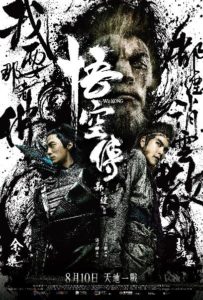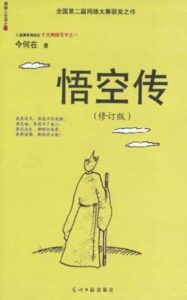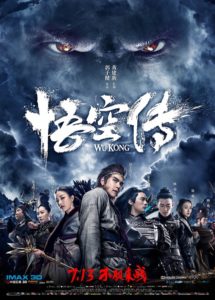Wu Kong
悟空传
China/Hong Kong, 2017, colour, 2.35:1, 3-D (China only), 122 mins.
Director: Guo Zijian 郭子健 [Derek Kwok].
Rating: 6/10.
Initially characterful take on the Monkey story soon changes into a conventional VFX onslaught.
Ancient China. Three hundred years ago, the verdant and well-watered Mount Huaguo, aka Flowers & Fruit Mountain, was destroyed by the Heavenly Kingdom’s Queen of Destiny (Yu Feihong) as she considered it to be a repository of evil. Sun Wukong (Peng Yuyan), aka Monkey, one of its best-known inhabitants, still bears hatred towards the Heavenly Kingdom and is determined to destroy it. It is now the 1,000-year changing of the guard at the kingdom’s Destiny Council, when new immortals are chosen from candidates. During the process at the Destiny Academy, Sun Wukong, in human guise, intervenes in a fight caused by one egotistical candidate, Juling (Yang Di), and rescues Zi (Ni Ni), the headstrong daughter of the Queen of Destiny. When Sun Wukong starts causing trouble, the queen sends her champion fighter, Tianpeng (Ou Hao), to deal with him; Zi also summons her favourite, semi-immortal warrior Yang Jian (Yu Wenle), aka Erlangshen, to do the same. Sun Wukong and the troubled Yang Jian are both imprisoned for fighting in the Destiny Academy but later  released. The queen fixes a headband on Sun Wukong that can control him, and allows Zi to have the device that works it, thus making Sun Wukong her servant. Although she finds him troublesome, she also starts to take a fancy to him. Sun Wukong’s personal mission is to destroy the Destiny Astrolabe 天机仪 which controls the universe by keeping everything in balance; when the queen realises this, she orders Tianpeng to kill him in order to preserve the universe’s equilibrium. A titanic fight takes place between Sun Wukong on one side and Yang Jian and Tianpeng on the other that’s watched by Zi, her dog and Juanlian (Qiao Shan), one of the candidates who has become Sun Wukong’s friend and also fancies Zi). All six are swept out of the Heavenly Kingdom and land in a village on Mount Huaguo, where Tianpeng recognises his long-lost love, Yue (Zheng Shuang), who had earlier been banished from the Heavenly Kingdom. Zi decides they should stay in the village and help to turn the barren ground green again. The queen attacks Mount Huaguo with storms but without success. She then arrives personally with her elite Celestial Warriors.
released. The queen fixes a headband on Sun Wukong that can control him, and allows Zi to have the device that works it, thus making Sun Wukong her servant. Although she finds him troublesome, she also starts to take a fancy to him. Sun Wukong’s personal mission is to destroy the Destiny Astrolabe 天机仪 which controls the universe by keeping everything in balance; when the queen realises this, she orders Tianpeng to kill him in order to preserve the universe’s equilibrium. A titanic fight takes place between Sun Wukong on one side and Yang Jian and Tianpeng on the other that’s watched by Zi, her dog and Juanlian (Qiao Shan), one of the candidates who has become Sun Wukong’s friend and also fancies Zi). All six are swept out of the Heavenly Kingdom and land in a village on Mount Huaguo, where Tianpeng recognises his long-lost love, Yue (Zheng Shuang), who had earlier been banished from the Heavenly Kingdom. Zi decides they should stay in the village and help to turn the barren ground green again. The queen attacks Mount Huaguo with storms but without success. She then arrives personally with her elite Celestial Warriors.
REVIEW
For its first 40 minutes, Wu Kong 悟空传 is an enjoyable spin on the early story of Sun Wukong, aka Monkey, and his attempt to take revenge on the Heavenly Kingdom for destroying his idyllic home of Flowers & Fruit Mountain. Despite Taiwan’s Peng Yuyan 彭于晏 [Eddie Peng] being lamentably miscast in the title role, the film is initially much bigger than its simian hero, with a good array of vividly drawn characters, okay action, good integration of special and visual effects, striking sets and photography – and most winningly, a sense of humour that keeps puncturing all the celestial self-importance. Alas, as soon as the story shifts earthwards, the humour vanishes and Wu Kong becomes a conventional, effects-driven action-fantasy, topped by a finale with the usual CGI overload. The biggest production so far in the iffy career of Hong Kong writer-director Guo Zijian 郭子健 [Derek Kwok] – easily eclipsing his wannabe disaster movie As the Light Goes Out 救火英雄 (2014) in size – it reaped a very handsome RMB697 million in the Mainland in a 3-D version but shows again that Guo has no idea how to meld character and action over the long span.
Now in his early 40s, Guo remains a promising director who’s yet to deliver on his promise. Starting off with small, character-driven films (crime dramas The Pye-Dog 野•良犬, 2007, and The Moss 青苔, 2008), he’s never been strong on script construction, as demonstrated by his first high-profile movie, the retro martial-arts comedy Gallants 打擂台 (2010) – co-written and directed with Zheng Sijie 郑思杰 [Clement Cheng] – which was a good idea weakened by an over-loose, unstructured screenplay. The same could be said for Wu Kong which, though a very free adaptation of the first novel by Jiangxi-born writer Jinhezai 今何在 (pen name of Zeng Yu 曾雨), at least preserves some of the original’s humour and “modern” approach in its first third, especially via the character of the Queen of Destiny’s headstrong daughter, gamely played by actress Ni Ni 倪妮 with more than a touch of the younger Shu Qi 舒淇.
Ironically, it’s when the story reaches the human world that the characters begin to play second fiddle to the effects, rather than the other way round; and there’s little relief in the next 80 minutes. (Visual effects supervisor Huang Zhiheng 黄智亨 [Henri Wong], who co-wrote/directed Guo’s last film, spacey badminton comedy Full Strike 全力扣杀, 2015, again gets a script credit.) As the Light Goes Out had difficulty forcing a disaster movie into a drama about conflicted firefighters; Wu Kong has the opposite problem – maintaining the audience’s interest in the characters once the cataclysmic action starts.
Despite being credited to five writers, the screenplay spends most of its time flirting with bigger ideas instead of developing them. The film could be seen as many things – an offbeat spin on a classic character, an allegory on the state vs the individual, a drama on heavenly destiny vs human will – but it can’t really make its mind up what it is, throwing ideas around at random. A good example comes early in the earthly section, when Ni’s character, outfitted in a white daopao with a red collar, announces with blazing eyes that her group will stay on and help the villagers re-green the desert of Mount Huaguo. It’s a delicious throwaway gag modelled on oldstyle Mainland films from the 1950s-1980s, but is just left hanging there, rootless and without context.
Not for the first time in his career, baby-faced Peng is hopelessly miscast in a tough costume role – remember his bearded warrior in Call of Heroes 危城 (2016)? In Wu Kong he tries to act gruff and animal-like as the volcanic Monkey but simply comes over as fake. More’s the pity, as Ni, who hasn’t always made the right choices in her career so far, is on top form here as the queen’s tearaway daughter who keeps scolding the pesky ape while gradually warming to him.
With not much personality among the other male leads – Mainland singer-actor Ou Hao 欧豪 (Fist & Faith 青禾男高, 2017) and Hong Kong’s Yu Wenle 余文乐 [Shawn Yue] both wooden in warrior roles – the rest of the cast joins Ni in injecting some personality into their characters. Mainland veteran Yu Feihong 俞飞鸿, 46, is terrific as the Queen of Destiny, effortlessly carrying her darkly regal costuming (by Hong Kong ace Li Bijun [Lee Pik-kwan]) and creating a strangely sympathetic “villainess” who just wants to keep the universe in balance against Monkey’s destabilising tricks. TV actress Zheng Shuang 郑爽 is passingly bright in an undeveloped role as the long-lost love of Ou’s warrior, while comic Qiao Shan 乔杉 has plenty of fun as an early incarnation of Sandy, here holding a hopeless torch for Ni’s character.
The music, by Guo’s regular collaborator Guan Weipeng 关维鹏 [Teddy Robin] and others, is especially good in the first third, alert to the various moods. Ditto for both sets and photography, by Lin Ziqiao 林子侨 (As the Light Goes Out) and Guan Zhiyao 关智耀 [Jason Kwan] (As the Light Goes Out; Full Strike), notably in the imposing grey/black interiors of the Destiny Academy and the queen’s quarters, where production, costume and visual design are all of a piece.
 The original novel was published online in 2000 and in revised book form (see left) the following year. Jinhezai, 40, also worked on the story development of Chinese Odyssey 2002 天下无双 (2002), on which he was officially credited with writing the lyrics for the two songs as well as helping out on the Chinese subtitles. More recently, he worked uncredited on Journey to the West: Conquering the Demons 西游 降魔篇 (2013), on which Guo was “associate director” to Zhou Xingchi 周星驰 [Stephen Chow]. Even though the script throws out most of the novel’s detail, he gets a writing credit on Wu Kong.
The original novel was published online in 2000 and in revised book form (see left) the following year. Jinhezai, 40, also worked on the story development of Chinese Odyssey 2002 天下无双 (2002), on which he was officially credited with writing the lyrics for the two songs as well as helping out on the Chinese subtitles. More recently, he worked uncredited on Journey to the West: Conquering the Demons 西游 降魔篇 (2013), on which Guo was “associate director” to Zhou Xingchi 周星驰 [Stephen Chow]. Even though the script throws out most of the novel’s detail, he gets a writing credit on Wu Kong.
CREDITS
Presented by New Classics Media (CN), Tianjin Xiron Entertainment (CN), Shanghai Dimension Films (CN), New Classics International Media (HK).
Script: Guo Zijian [Derek Kwok], Jinhezai, Huang Hai, Fan Wenwen, Huang Zhiheng [Henri Wong]. Novel: Jinhezai. Photography: Guan Zhiyao [Jason Kwan]. Editing: Xu Weijie [Matthew Hui]. Music: Guan Weipeng [Teddy Robin], Zhu Yunbian. Additional music: Wei Qiliang [Tommy Wai]. Production design: Lin Ziqiao. Costume design: Li Bijun [Lee Pik-kwan]. Styling: Yu Jia’an [Bruce Yu]. Action: Gu Xuanzhao. Visual effects: Huang Zhiheng [Henri Wong] (More, Dexter Studios, Macrograph, MAS).
Cast: Peng Yuyan [Eddie Peng] (Sun Wukong/Monkey), Ni Ni (Zi), Yu Wenle [Shawn Yue] (Yang Jian/Erlangshen), Ou Hao (Tianpeng), Zheng Shuang (Yue), Qiao Shan (Juanlian), Yu Feihong (Shangsheng Tianzun/Queen of Destiny), Yang Di (Juling), Ba Yin (Ling Guzi), Wang Deshun (Pu Ti), Wang Dongyi (assistant), Yin Xue (fairy), Wang Quanxi (old monkey), Lai Xiaosheng (Jiu Jin), Li Yang (Er Niu), Feng Jun (Auntie Zhu), Fan Shuzhen (Ba Shen), Zhang Yiqian, Cheng Peng (Juling’s assistants), Qiao Mingling (Lei), Li Suyun (Dian), Wang Dequan (Feng), Li Hanchen (Yu), Zhang Xiaoming (young Sun Wukong), Li Haoze (young Yang Jian), Li Shang’en (young Zi), Wang Teng (Jingang).
Release: China, 13 Jul 2017; Hong Kong, 10 Aug 2017.
